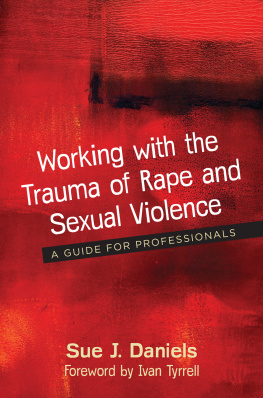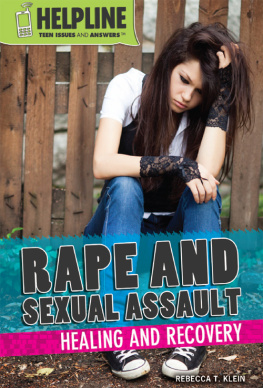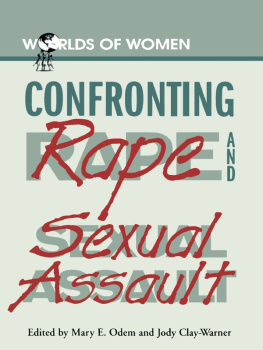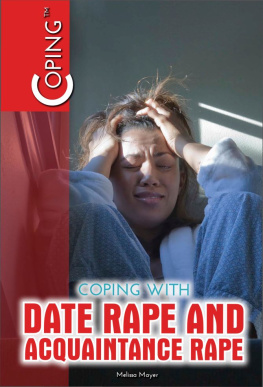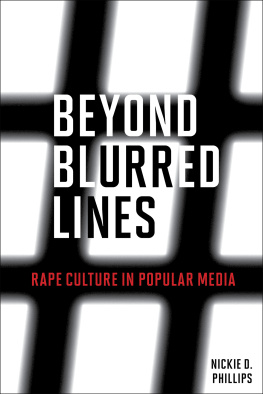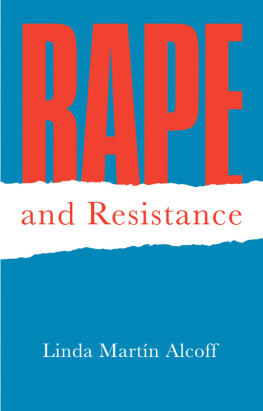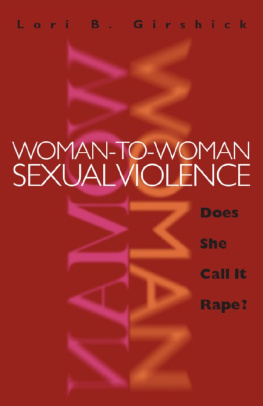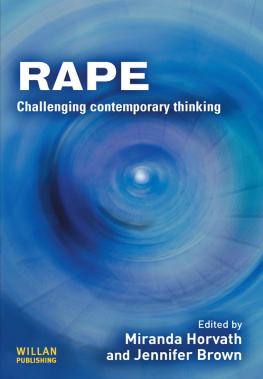
Working with the Trauma of
Rape and Sexual Violence
A Guide for Professionals
Sue J. Daniels
Foreword by Ivan Tyrrell

Jessica Kingsley Publishers
London and Philadelphia
Contents
Foreword
An attractive and vivacious young woman came to see me because she was having panic attacks, flashbacks, and intrusive thoughts and exhibiting many other distressing symptoms of PTSD and living in a state of high anxiety and hypervigilance, particularly when in the presence of men who were attracted to her and despite the fact that she hoped for a normal, intimate and loving heterosexual relationship. This behaviour started after she was attacked and raped twice, a month apart, by two different strangers. Both men were caught and convicted.
Since the rapes and subsequent court cases she told me she had changed jobs several times because of her hysterical distress in the presence of men at work. Her psychological state led her to seek help from a clinical psychologist and a counsellor encounters she had found disturbing, painful and useless. She hated talking about exactly what had happened. (Long-term talking therapy tends to reinforce trauma symptoms and embed them more deeply.)
Without knowing any more detail about the rapes than you have just read I detraumatised her in one session by using the rewind technique we at Human Givens College have refined and taught to thousands of people in the UK and abroad. (There are other techniques used for detraumatising people but our research found this the most reliable and safe way to do it.) When she returned a week later she confirmed that the anxiety had gone. She reported that after the session she had gone straight home, emptied her filing cabinet of all the papers relating to the two court cases, and thrown them in the dustbin, with no emotion at all. She told me that prior to me seeing her, just opening the door of the room where the cabinet was situated made her burst into tears.
Having the ability to detraumatise people suffering from extreme anxiety symptoms is one of the most important skills any psychotherapist or counsellor possesses. This is because post traumatic stress disorder (PTSD) is often at the root of so many conditions that therapists are called upon to treat: including alcohol and drug addiction and other addictive behaviour, chronic depression, anger disorder, sexual and relationship problems and many other expressions of anxiety. Consequently I was pleased to see that, in Sue Daniels book, Working with the Trauma of Rape and Sexual Violence , she hasnt shied away from explaining how this dreadful cause of so much emotional pain sexual violence can be treated quickly in most cases.
It is impossible for a traumatised person to get their innate emotional needs met in a balanced way. For example, we all have an innate need for intimacy, but anyone who has been traumatised by violent rape will, at a fundamental level, find it hard to relax and enjoy intimacy with their loving partner because their alarm system is put on high alert when intimacy becomes sexual, however much they wish it were otherwise. The alarm cannot be turned off by an effort of will.
People become traumatised when they freeze in the REM state during an event that their limbic system perceives as life-threatening. Because the REM state is also the programming state of the brain, whilst in that freeze state they are being programmed with the mass of information about whats happening as its taken in through their senses. Traumatic symptoms occur later whenever the brain pattern-matches to any aspect of that stored information and it then fires off the fight-or-flight response. For example, a young woman I detraumatised had severe panic attacks whenever she saw a rubbish bin even though, intellectually, she knew bins are harmless. But she had had an experience where a particular rubbish bin was not harmless. Her leg had been blown off by a terrorist bomb that had been placed in a rubbish bin. Her limbic system couldnt take a chance that any rubbish bin she saw would not kill her and so pumped her system with adrenalin every time she saw a bin thereafter until, that is, she was detraumatised, which only took a single session of therapy.
Psychological repair work over and above the rewind is often needed with people who have suffered sexual violence and abuse, particularly if it was sustained over a period of time and not just a single incident, but that should not begin until after they have been detraumatised. Sometimes, if they were in a good mental and emotional state before the violence occurred, they may only need to be detraumatised to pick up the pieces of their life again.
When properly applied, the rewind technique will almost always dissolve phobias, even serious ones, in one session. Likewise it will detraumatise disturbing flashbacks and cure the most severe post traumatic stress disorder (PTSD) caused by a single event, whatever the cause. With people who have a history of abuse, however, many sessions may be needed to deal separately with all the major incidents that traumatised them. Recent experience by experienced practitioners, however, has shown that it is sometimes possible to detraumatise many years of abuse and violent events in a single session. However, someone with such a history would generally still need to be seen a number of times, especially if the abuse had interfered with their normal psychological development.
The three advantages of this therapy
It is safe (unlike critical incident debriefing).
The rewind technique is fast .
The rewind technique is non-voyeuristic . (The patient does not have to describe the event/events to you, a great advantage with traumatised victims of rape or sexual abuse.)
Whatever method used there are three elements to successful trauma treatment.
The trauma template must be activated in the traumatised patient first a degree of emotion about the abuse must be present.
The person is then deeply relaxed using guided imagery.
They are then dissociated from the memories of the abuse. The limbic system recodes the memory as non-threatening because the person is physiologically so deeply relaxed, it says to itself, as it were, Im so relaxed when reviewing these memories that there can be no danger here.
I think Sue has done a great service producing this well-researched book on such a grim subject. She describes the many forms of abusive behaviour and the symptoms they produce with great clarity and compassion. It will help many who struggle to heal the tortured souls of victims.
Ivan Tyrrell
Director of Human Givens College and co-author of
Human Givens: The new approach to emotional
health and clear thinking
Author Note
The author does not accept responsibility for any of the materials, information and/or fictional case histories that some individuals may find distressing in this publication. Therefore the author disclaims and accepts no responsibility for any harm, injuries or unforeseen outcome as a result of any information contained within it. This book represents the true nature of rape and sexual violence and persons wishing to obtain an understanding of this sensitive issue may see and hear much worse than is featured within these pages.
Jigsaw Post Trauma & Counselling Services holds a current Crown Copyright Registration Licence of the Public Sector Information (PSI). (Licence number: C2008001507)
Much of the court procedure and legal information featured in this book is taken from websites containing Acts of English Law as and when they are provided, all of which is readily available to the general public, for example Sex Offences Acts and Home Office information.
Next page
